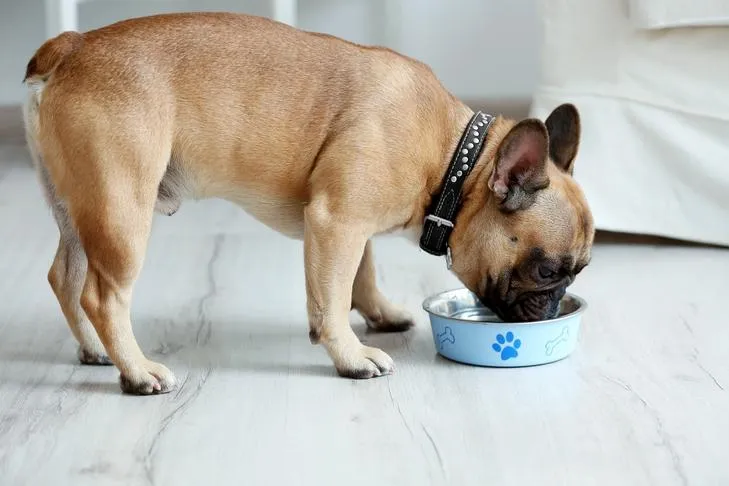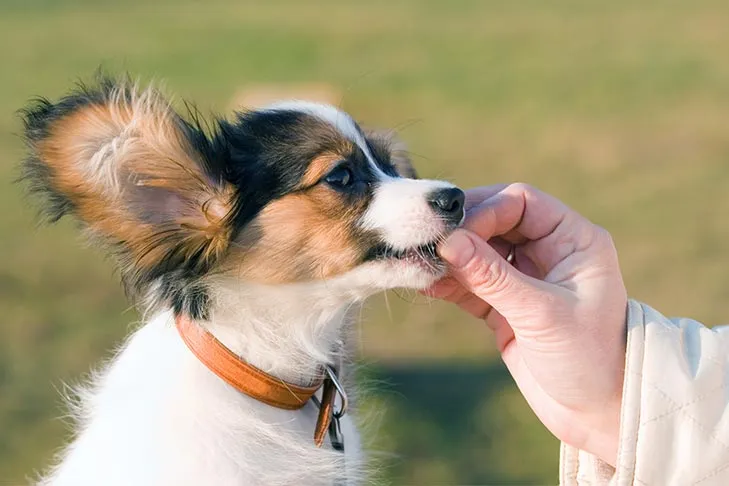Navigating the world of human foods can be tricky for dog owners. While it’s tempting to share a bite of your meal with your beloved canine companion, not all human foods are safe for dogs. Understanding what’s safe and what’s toxic is crucial for your dog’s health and well-being. This comprehensive guide will help you distinguish between the human treats that can be shared and those that pose a serious risk to your furry friend. Knowing the difference can prevent serious health issues, from an upset stomach to life-threatening conditions.
Human Foods Dogs Can Safely Eat (in Moderation)
Many common human foods, when prepared correctly and offered in moderation, can be a healthy and enjoyable addition to your dog’s diet. These can provide essential nutrients and variety, but always remember to introduce new foods slowly and observe your dog for any adverse reactions.
Bread
Small amounts of plain, unseasoned bread are generally safe for dogs. However, bread offers little nutritional value and can contribute to weight gain due to its carbohydrate and calorie content. Always ensure it contains no harmful ingredients like raisins, which are highly toxic to dogs. While homemade bread might be better than store-bought due to fewer preservatives, it’s best offered as an occasional treat rather than a dietary staple.
Cashews
Cashews can be given to dogs in small quantities. They contain beneficial nutrients like calcium, magnesium, antioxidants, and protein. Nevertheless, despite having less fat than some other nuts, overfeeding cashews can lead to weight gain. Always opt for unsalted cashews as excessive salt can be detrimental to your dog’s health.
Cheese
Most dogs can enjoy cheese in small to moderate amounts, provided they are not lactose intolerant (a rare but possible condition in dogs). Lower-fat varieties such as cottage cheese or mozzarella are preferable due to the high-fat content in many cheeses. Some dogs also enjoy specialized dried cheese chews, like Himalayan dog chews.
 An All American Dog resting its head on a kitchen table, looking intently at a piece of cheese.
An All American Dog resting its head on a kitchen table, looking intently at a piece of cheese.
Coconut
Coconut contains lauric acid, which may help fight bacteria and viruses. It can also be beneficial for fresh breath and skin conditions such as hot spots, flea allergies, and itchy skin. Coconut milk and coconut oil are also safe. Crucially, always remove the fibrous outer shell, which can be a choking hazard or cause intestinal blockage if ingested.
Corn
Corn is a common ingredient in many commercial dog foods, serving as a good source of carbohydrates, protein, and fiber. While the kernels are safe, the cob itself is not. A corn cob can be very difficult for a dog to digest and can lead to a dangerous intestinal blockage. If you share corn, always ensure it is completely removed from the cob.
Eggs
Fully cooked eggs are an excellent source of protein for dogs and can even help settle an upset stomach. It’s vital that eggs are cooked thoroughly, as raw egg whites contain avidin, which can interfere with biotin absorption and potentially lead to a biotin deficiency over time.
Fish
Fish provides good fats and amino acids, offering a significant health boost for dogs. Salmon and sardines are particularly beneficial; salmon is rich in vitamins and protein, while sardines offer extra calcium from their soft, digestible bones. However, always ensure fish is fully cooked and cooled. Except for sardines, meticulously remove all tiny bones to prevent choking or internal injury. Limit fish intake to no more than twice a week. Raw or undercooked salmon, in particular, can contain parasites that are highly toxic and can cause severe illness or even death in dogs.
Ham
While a small piece of ham won’t harm your dog, it’s not the healthiest option. Ham is typically high in sodium and fat, making it an unsuitable regular treat. Occasional, very small portions are acceptable, but it should not become a continuous habit due to the risk of contributing to obesity or pancreatitis.
 A French Bulldog eating food from a metallic bowl on the floor inside a home.
A French Bulldog eating food from a metallic bowl on the floor inside a home.
Honey
Honey is packed with numerous nutrients, including vitamin A, potassium, calcium, magnesium, copper, and various antioxidants. Small amounts of local honey can potentially help dogs with seasonal allergies by introducing trace amounts of pollen, thereby building immunity. Beyond consumption, honey can also be used topically as an antibacterial treatment for minor burns and superficial cuts.
Milk
Dogs can have milk, but caution is advised. Many dogs are lactose intolerant and may experience digestive upset such as diarrhea or gas after consuming dairy. If your dog can digest it without issues, a very small amount is generally fine, but plain water remains the best hydration source.
Peanut Butter
Peanut butter is an excellent source of protein, heart-healthy fats, and vitamins B and E for dogs. Always choose raw, unsalted peanut butter. Critically, you must read the label carefully to ensure it does not contain xylitol, an artificial sweetener that is highly toxic and potentially fatal to dogs.
Peanuts
Unlike almonds, plain peanuts are safe for dogs. They are rich in good fats and proteins, beneficial in moderation. Too many peanuts can lead to an excessive fat intake, potentially causing pancreatic issues. Always choose unsalted peanuts, as high salt levels are difficult for dogs to process and can lead to sodium ion poisoning. For more ideas on healthy treats, you can explore what fresh food can I feed my dog.
Popcorn
Plain, air-popped, unsalted, and unbuttered popcorn is safe for dogs in moderation. It contains riboflavin, thiamine (beneficial for eye health and digestion), and small amounts of iron and protein. Ensure all kernels are fully popped to prevent choking hazards or dental damage.
Pork
Pork is a highly digestible protein source, abundant in amino acids, though it is higher in calories per pound compared to some other meats. It may also be a good option for pets with allergies to other common proteins. As with all meats, it must be thoroughly cooked and free of bones, excessive fat, and seasonings.
Quinoa
Quinoa is increasingly found in high-quality dry dog foods due to its robust nutritional profile. It serves as a healthy alternative to more common starches like corn, wheat, and soy often used in kibble formulations.
 A Samoyed puppy laying comfortably in the green grass outdoors, looking relaxed.
A Samoyed puppy laying comfortably in the green grass outdoors, looking relaxed.
Shrimp
A few fully cooked shrimp, with the shell, tail, head, and legs entirely removed, are safe for dogs occasionally. Shrimp are low in fat, calories, and carbohydrates, while being high in antioxidants, vitamin B-12, and phosphorus. Ensure they are plain and unseasoned.
Tuna
Dogs can consume cooked, fresh tuna in small amounts. It’s an excellent source of omega-3 fatty acids, which promote heart and eye health. Canned tuna, however, should be given sparingly due to its mercury content and often high sodium levels. If offering canned tuna, choose varieties packed in water (not oil) and ensure it contains no added spices or seasonings.
Turkey
Plain, cooked turkey without excess fat, skin, or bones is safe for dogs. Poultry bones can splinter during digestion, leading to internal injuries or blockages. Avoid any turkey prepared with excessive salt, seasonings, onions, or garlic, as these ingredients can be toxic.
Wheat or Grains
Contrary to popular belief, most dogs do not need a grain-free diet, and grains like wheat and corn are valuable sources of protein, essential fatty acids, and fiber. If your dog has a diagnosed grain allergy, avoidance is necessary, but for most dogs, grains are a healthy component of their diet. Always consult your veterinarian if you suspect a food allergy. For insights into canine nutrition, you might want to read about can dogs eat what humans eat.
Yogurt
Plain, unsweetened yogurt can be an acceptable snack for dogs. The active bacteria in yogurt provide probiotics that can support a healthy digestive system. However, like milk, some dogs may struggle to digest dairy products. Always choose plain yogurt, avoiding any with added sugar, artificial sweeteners (especially xylitol), or fruit flavorings.
 A small Papillon puppy gently taking a treat from a human hand, showing careful interaction.
A small Papillon puppy gently taking a treat from a human hand, showing careful interaction.
Human Foods Dogs Must Avoid
It is crucial for every dog owner to be aware of human foods that are dangerous or even deadly for dogs. Accidental ingestion of these items can lead to severe illness, organ damage, or even death. If you suspect your dog has eaten any of the following, contact your veterinarian immediately.
Chocolate
Chocolate is highly toxic to dogs due to the presence of theobromine, a stimulant that dogs metabolize much more slowly than humans. Even small amounts can cause symptoms like vomiting, diarrhea, tremors, seizures, and in severe cases, heart failure or death. Dark chocolate, baking chocolate, and cocoa powder contain the highest concentrations of theobromine, making them the most dangerous.
Grapes and Raisins
The exact toxic compound in grapes and raisins is unknown, but these fruits can cause acute kidney failure in dogs, even in small quantities. Symptoms can appear within 24 hours and include vomiting, diarrhea, lethargy, increased thirst, and decreased urination. By the time clinical signs are evident, kidney damage may already be severe, and the prognosis can be poor.
Xylitol (Artificial Sweeteners)
Xylitol is a sugar substitute found in many human products, including sugar-free gum, candies, baked goods, toothpaste, and some brands of peanut butter. It causes a rapid and severe release of insulin in dogs, leading to a sudden drop in blood sugar (hypoglycemia), which can be life-threatening. Xylitol can also cause liver failure and blood clotting disorders. Always check labels for xylitol before sharing any human food or product with your dog.
Onions, Garlic, and Chives
All members of the Allium family (onions, garlic, chives, leeks) are toxic to dogs, whether raw, cooked, or powdered. They contain compounds that can damage red blood cells, leading to hemolytic anemia. Symptoms, which may be delayed for several days, include lethargy, weakness, pale gums, vomiting, and diarrhea. Garlic is often considered more potent than onions.
Avocado
Avocado contains a fungicidal toxin called persin, which can cause vomiting and diarrhea in dogs, especially if ingested in large quantities. While some sources suggest dogs are more resistant than other animals, it’s still best to err on the side of caution. Furthermore, the high-fat content can lead to pancreatitis, and the large pit presents a significant choking hazard and can cause an intestinal blockage.
Macadamia Nuts
Macadamia nuts can cause weakness, tremors, vomiting, fever, and depression in dogs. While usually not fatal, the symptoms can be distressing and last for 12 to 48 hours. The exact toxic mechanism is not fully understood.
Alcohol and Caffeine
Alcohol, in any form, is highly toxic to dogs and can cause severe symptoms including vomiting, diarrhea, decreased coordination, central nervous system depression, breathing difficulties, tremors, and even coma or death. Dogs are also much more sensitive to caffeine than humans. Found in coffee, tea, soda, and energy drinks, caffeine can cause restlessness, hyperactivity, tremors, elevated heart rate, and seizures.
Salty Foods
While salt is an essential mineral, excessive amounts can lead to sodium ion poisoning in dogs. Symptoms include vomiting, diarrhea, tremors, elevated body temperature, seizures, and potentially death. Avoid feeding dogs salty snacks like pretzels, chips, or excessive amounts of cured meats.
Yeast Dough
Raw yeast dough is dangerous for dogs for two reasons. First, the warm, moist environment of a dog’s stomach can cause the dough to rise, leading to bloating and potentially a life-threatening condition called gastric dilatation-volvulus (GDV) or bloat. Second, as the yeast ferments, it produces alcohol, which can lead to alcohol poisoning.
Corn on the Cob
While corn kernels are safe, the cob itself is a serious hazard. Dogs often swallow large pieces of the cob, which are indigestible and can cause a severe intestinal blockage requiring emergency surgery.
Conclusion
Understanding what your dog can and cannot eat is paramount to ensuring their health and safety. While sharing certain human foods can be a delightful way to bond and supplement their diet with beneficial nutrients, it’s vital to be vigilant about potentially toxic items. Always introduce new foods gradually and in moderation, and when in doubt, consult your veterinarian. Prioritizing your dog’s diet means protecting them from harm and ensuring a long, healthy, and happy life by your side. For more detailed information on specific dietary concerns, keep exploring our articles on Dog Care Story!
